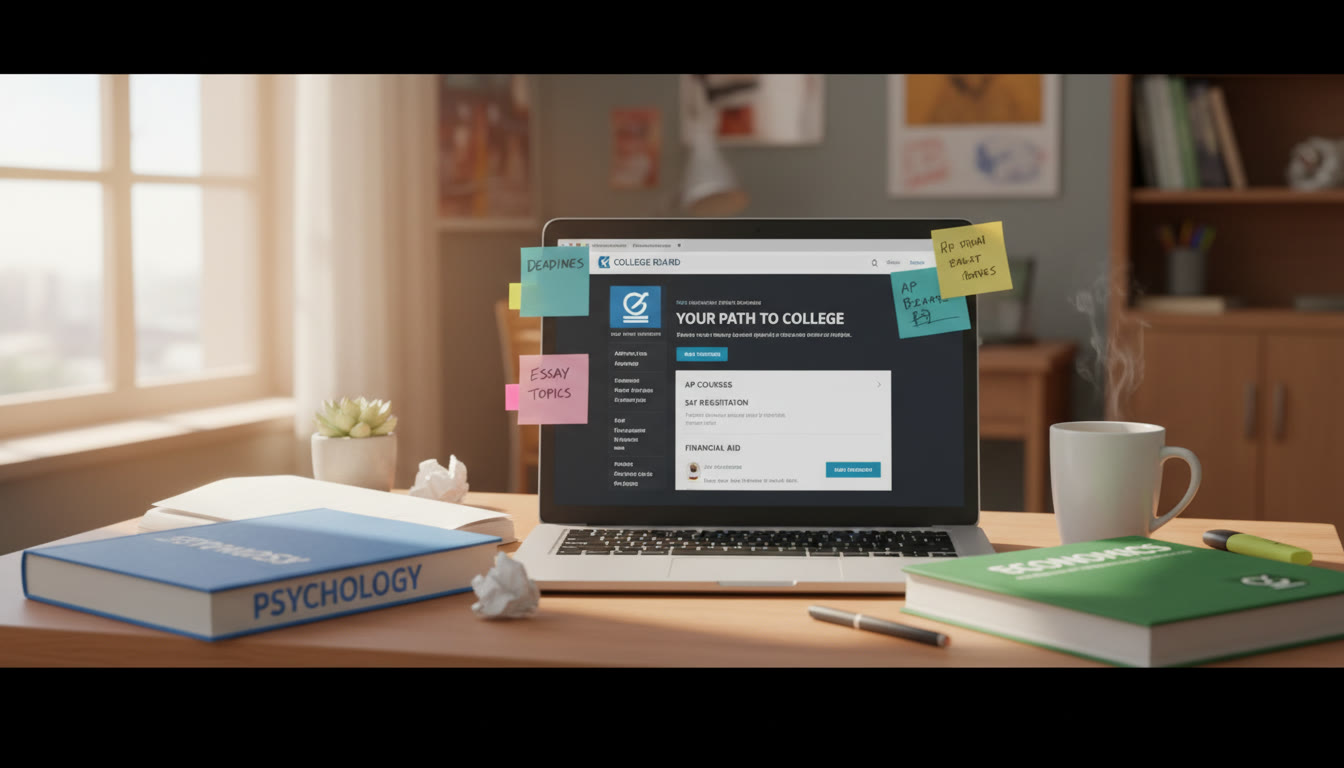Intro: The Choice That Feels Bigger Than a Single Class
Choosing between AP Psychology and AP Macroeconomics or AP Microeconomics can feel oddly consequential. It’s just one year of high school, but the ripple effects touch college applications, early major decisions, internships, and how you begin to see the world. Some students pick classes because they sound fun; others ask, “Which one will actually help my intended major?” This article walks you through the practical differences, the skills you’ll gain, and the real-world signals each AP sends to colleges and future employers.

Why this decision matters: Beyond just a test score
AP classes are more than an exam: they teach habits of mind. The difference between Psychology and Economics is not only content—neurons versus supply curves—but also how you analyze problems, present arguments, and apply quantitative or qualitative reasoning. Those habits can make introductory college courses less intimidating and show admissions officers that you’ve already begun preparing for your academic path.
Quick reality checks
- AP credit policies vary significantly by college—some give course credit, some give placement, and others offer neither. Check your target schools.
- Taking a course aligned with your intended major demonstrates interest and intellectual curiosity—two things admissions notice.
- Success in an AP course signals academic readiness; a strong AP exam score is a data point in your profile but not the whole story.
What you actually learn: Skills and content compared
Let’s compare the classes side-by-side so you can see what you’d realistically get out of each one.
| Course | Core Content | Skills Developed | Typical College Equivalency |
|---|---|---|---|
| AP Psychology | Biological bases, cognition, development, social psychology, mental health and disorders | Critical reading of studies, interpreting data, writing explanations, connecting theory to behavior | Intro Psych (one semester) |
| AP Macroeconomics | National income, inflation, unemployment, monetary and fiscal policy, international finance | Graph interpretation, quantitative reasoning, modeling, causal explanation | Intro Macro (one semester) |
| AP Microeconomics | Supply and demand, market structures, consumer choice, production, price mechanisms | Analytical problem-solving, marginal reasoning, algebraic manipulation, data interpretation | Intro Micro (one semester) |
What this means in practice
AP Psychology trains you to think about people—how they perceive, decide, and react. It’s concept-rich and less calculation-heavy, though it still expects you to interpret research and basic statistics. Economics (macro and micro) is more mathematical and model-driven; you’ll spend time manipulating graphs and numbers and making predictions.
Match by major: Which course aligns with common intended majors?
Below are practical recommendations: which AP tends to be most useful if you’re leaning toward certain college majors. Remember these are general guidelines—individual programs differ.
Majors that lean toward Psychology
- Psychology and Neuroscience: AP Psychology is an obvious fit—foundational concepts, lab thinking, and vocabulary all translate directly to first-year courses.
- Education: Understanding learning theories and developmental stages from AP Psych gives you a head start for courses on pedagogy and child development.
- Social Work and Counseling: AP Psych introduces mental health frameworks and ethical considerations that appear in early major coursework.
Majors that lean toward Economics
- Economics and Business: AP Micro and AP Macro are directly relevant—expect to use graphs, marginal analysis, and macro indicators from day one.
- Political Science and Public Policy: Macroeconomics helps you understand fiscal policy, trade, and institutions that frequently surface in policy classes.
- Finance and Accounting: Microeconomics sharpens quantitative reasoning and market logic that employers value.
Majors where either helps
Some majors benefit from either course, though for different reasons:
- Data Science/Statistics: Economics gives you stronger math practice; Psychology helps with experimental design and human-centered interpretations.
- Marketing: Psychology gives insights into consumer behavior, while microeconomics explains market structures and pricing—both are useful.
- Healthcare Fields: Psychology gives clinical and behavioral context; economics helps you understand healthcare systems, insurance, and resource allocation.
How colleges interpret your AP choices
Admissions officers don’t expect perfection. They look at trajectory: if you plan to major in economics, taking AP Micro or Macro suggests genuine interest. If you want to study psychology, AP Psych signals early commitment. But context matters—if your school offers only one of the two, taking the more challenging course available looks responsible.
Placement vs. credit
Many colleges accept AP scores for placement into higher-level courses rather than for credit; this matters because placement can let you skip large introductory lectures and dive into advanced topics or research earlier. For majors that are course-sequencing heavy—like economics or psychology—this can affect how quickly you start major-specific sequences.
Which AP is harder? What to expect from exams
Difficulty is subjective, but here are useful contrasts:
- AP Psychology: Heavy on memorization of terms and theories, plus application and interpreting classic studies. The free-response questions ask you to synthesize and explain psychological scenarios.
- AP Micro/Macro: More calculation and graphing. Expect to manipulate models, interpret data, and show step-by-step reasoning on both multiple-choice and free-response questions.
If numbers or algebra make you nervous, you might find economics steeper at first. If long lists of terms make you sweat, psychology’s breadth of vocabulary could be challenging. Both exams reward clear writing and practiced problem-solving.
Study strategies tailored to each AP
For AP Psychology
- Create concept maps that link theories, experiments, and outcomes—seeing relationships helps with both multiple-choice and free-response questions.
- Practice short, clear written explanations for common prompts (e.g., compare two theories, explain an experiment’s result).
- Use flashcards for key terms, but pair them with example scenarios so you can apply, not just recall.
For AP Micro/Macro
- Master graphs: be able to shift curves and explain why they move. Draw clean diagrams and label axes clearly.
- Practice algebra and word problems. Translate a written scenario into an equation or a graph quickly.
- Work timed free-response practice where you both show calculations and explain the economic intuition behind them.
Real-world examples: How the courses translate on campus
Imagine Anna, who plans to major in political science. She took AP Macroeconomics and came into freshman Political Economy with confidence; she understood what GDP and inflation measured and contributed to lively seminar discussions about fiscal policy. Then picture Jamal, aiming for a major in behavioral neuroscience: AP Psychology gave him vocabulary and a grasp of experimental design, and he landed a research assistant role the summer after freshman year because he could speak intelligently about developmental paradigms.
When making the decision, ask yourself these questions
- Do you enjoy working with numbers and graphs, or do you prefer conceptual, text-based thinking?
- What majors are you actually considering—and which AP will help you place into higher-level courses?
- Which course fits your teacher and schedule? A great teacher can make any AP course worthwhile.
- Are you aiming for AP credit at a specific college? Check their policy before committing.
How to combine them (and when it’s smart to do both)
If your schedule allows, taking both can be a powerful combination: economics sharpens your analytical toolkit; psychology teaches you to think about human behavior—the two together are especially valuable for majors like marketing, public policy, behavioral economics, and interdisciplinary social sciences. If you can’t do both, prioritize the one most aligned to your major, or the one that addresses a gap in your skills (math practice vs. experimental design).
Example plan for a sophomore interested in Business
- Year 1: AP Microeconomics (if available) to build quantitative and market intuition.
- Year 2: AP Psychology as an elective to learn about consumer behavior and persuasion.
How tutoring and personalized support help—and where Sparkl fits naturally
Strong results in AP depend on targeted practice, not just hours spent. That’s where personalized tutoring shines. A tutor can identify your weakest zones (graph shifts, research methods, or writing clarity) and build a tailored study plan. For many students, one-on-one guidance accelerates progress—fast feedback on practice problems turns mistakes into reliable knowledge.
Sparkl’s personalized tutoring and benefits—one-on-one guidance, tailored study plans, expert tutors, and AI-driven insights—can be especially helpful if you’re balancing multiple APs or trying to pivot your study approach mid-course. Working with a tutor who adapts lessons to your pace lets you focus on transferable skills like argument construction, experiment interpretation, or efficient graphing techniques.
Sample comparison matrix: Which AP helps different major goals?
| Intended Major | Most Helpful AP | Why | Suggested Extra Support |
|---|---|---|---|
| Economics | Micro and Macro | Direct overlap with models, graphs, and quantitative reasoning | Graph workshops, timed FRQ practice |
| Psychology | AP Psychology | Direct content overlap; prepares you for research methods | Research methods tutoring, flashcard systems |
| Business/Marketing | Either (Micro for pricing logic; Psych for consumer behavior) | Both contribute complementary skills | Case studies, applied projects |
| Data Science | Economics (quant) or Psychology (experimental) | Economics helps with modeling; Psych helps with experimental design and interpretation | Intro statistics, coding basics |
Study schedule blueprint: 10 weeks to AP confidence
Whether you pick Psych or Economics, use this mini-plan to structure your final two months of prep.
- Weeks 1–2: Diagnostic. Take a full practice exam to identify weak areas. Create a study log.
- Weeks 3–6: Focused drills. Target weakest units. For Econ: daily graph practice. For Psych: flashcard + applied scenarios.
- Weeks 7–8: Mixed practice. Timed sections and free-response practice. Start integrating cumulative review.
- Weeks 9–10: Full exams and review. Simulate test day twice; review mistakes and refine timing.
Pairing this schedule with a tutor—for example, a Sparkl tutor who provides adaptive study plans and AI-driven feedback—can make these weeks far more efficient. Tutors help you avoid spinning wheels and ensure each study session directly improves performance.
Final considerations: Choosing for passion, practicality, or both
There’s no universal “right” answer. If your major is clearly defined and requires quantitative skills, economics makes sense. If you’re leaning into behavioral science, education, or healthcare, psychology is a natural fit. If you’re undecided, reflect on what energizes you: do you enjoy explaining why people behave a certain way, or do you prefer dissecting models and data to predict outcomes? Your enthusiasm will sustain long-term learning more than any strategic calculation.
When doubt remains
- Talk to teachers and college advisors—local knowledge about course rigor and college credit can be decisive.
- Consider sampling both topics before committing: watch short lecture videos, read introductory chapters, or try a weekend online mini-course.
- If you can afford tutoring, try a short diagnostic session. A tutor can often clarify which skills need more reinforcement and whether you’re likely to thrive in one course over another.
Closing thoughts: Your path, your pace
AP Psychology and AP Macroeconomics/Microeconomics each offer powerful foundations—one into the mind, the other into systems and markets. Both teach critical thinking, but they do so through different lenses. Your intended major is the best compass, but don’t be afraid to choose the class that strengthens your weakest skills or simply excites you most. The most successful students combine curiosity with consistent practice—and when they want to accelerate results, they use targeted help like personalized tutoring to turn potential into performance.

Whichever path you pick, plan deliberately, practice intentionally, and keep your curiosity alive. The AP you choose should serve as a bridge to meaningful college experiences—not a final destination. Good luck, and study smart.


















No Comments
Leave a comment Cancel